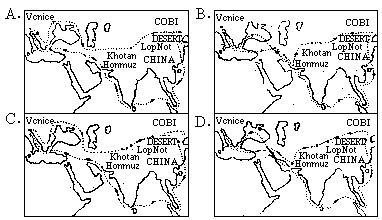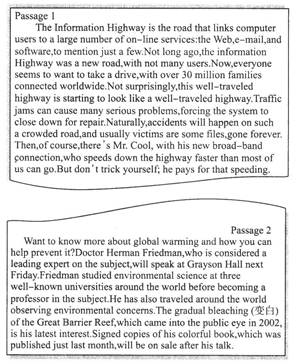
题目列表(包括答案和解析)
The 11th Beijing International Tourism Festival opening ceremony kicked off at the Olympic green on October 23, 2009, drawing together performance groups and artists from 71 countries and 18 districts and counties in and around Beijing.
25 floats(彩车) representing different aspects of travel and life in Beijing acted as mobile name cards for international friends, according to Beijing's Deputy Mayor Ding Xiangyang, adding they represent a new focus for tourism in this ancient cultural and historical city.
An impressive drum performance marked the prelude (前奏) of this year's tourism festival, with 60 Chinese traditional drummers kicking off the ceremony, while sending their birthday wishes to the motherland.Female drum players and water splash drummers also brought the drum performances to a climax(高潮).
Following the drum performance was an eye-catching parade of floats featuring Beijing's famous scenic spots. The Forbidden City, Beihai Park, the Summer Palace, the Bird's Nest, Shichahai and Happy Valley were all represented as they gracefully moved along the boulevard(林阴大道). Each float was led by an elegant model dressed in special attire with elements of the scenic spots represented.
Park Su-Ho, an assembly(集合) member from the Economy & Investment Committee of the Republic of Korea is the leader of their delegation. They do performance during the opening ceremony along with their traditional folk dance.
“This is the first time we've been in China.Beijing is very tidy and beautiful, we feel proud to take part in this tourism festival and we hope the Chinese people like our performance.”
The three day festival concluded at Happy Valley on Sunday. Over the weekend the main exhibition venue around the Olympic park displayed Beijing's rich tourism resources found across its 18 districts and countries, while at the same time visitors appreciated splendid exotic performances from international artists.
6.According to the writer what is the first excellent performance or program during the ceremony?
A.The parade of the 25 floats.
B.A drum performance.
C.Park Su-Ho's folk dance.
D.The main exhibition.
7.From the passage we can see both the floats and the models were pictured with________.
A.famous scenic spots in Beijing
B.the Olympic pictures
C.beautiful flowers
D.special attire
8.According to the passage the parade of the 25 floats represent ________.
A.all the scenic spots in Beijing
B.a new focus for Beijing
C.the 60th birthday of our country
D.the development of Beijing
9.What does the underlined word “exotic” in the last paragraph mean?
A.Traditional. B.Folk.
C.Eye-catching. D.Foreign.
10.What's the purpose of the writer in writing this passage?
A.To tell us some scenic spots in Beijing.
B.To let us know how flourish today's Beijing is.
C.To tell us an opening ceremony in Beijing.
D.To let us know the great change of Beijing after the Olympic Games.
阅读理解:
阅读下列短文,从所给的四个选项中,选处最佳答案.
Marco Polo was a Venetian traveller, whose accounts of his journey across the world from Venice to China and back, make one of the greatest books of all his time.
Marco Polo was born either at Venice, or perhaps at Korcula, a place on an island off Dalmatian coast in 1254. His father, Niccolo Polo, and his father's brother, Matteo set out in 1261, on a long trading journey which led them to the court of Kublai, the Great Khan, who ruled over China. After seven years they returned to Italy.
Two years passed before the brothers decided to start again on their travels, and this time, they took with them Niccolo'c son Marco, then 17 years old. They trvelled to Acre and from there rode overland to Hormuz on the Persian Gulf. From there they turned northward and made their way through Persia to Balkh, and Khotan. From there they passed near Lop Nor, crossed the Gobi Desert and entered China by way of Su—chou. At length, in 1275, after a journey lasting three years, they introduced themselves to Kublai Khan at his summer palace at Shangtu.
Marco records that he made rapid progress in the Great Khan's favour. He studied the Mongol language and the emperor asked him to look after the travelling groups made up of foreign visitors from different parts of the world and show them around his kingdom. He became skilful(娴熟)and clever at business. Marco made careful notes of his journey, the state of the cities, the customs (风俗)of the people, and the kinds of crops and other products. After 17 years travelling in the service of the Khan, Marco, together with his father and uncle, returned to Venice. The journey took them 3 years and they arrived in 1295.
1. Marco Polo was born perhaps______________.
[ ]
A. on an island
B. on the coast of Dalmatian
C. in Persian Gulf
D. in Gobi Desert
2. Which of the following is true according to the article?
[ ]
Marco Polo first travelled to China in about_______, arrived at the emperor's summer palace in _____and left China for Venice in _________.
A. 1275;1278;1292
B. 1268;1275;1295
C. 1270;1275;1293
D. 1270;1278;1295
3. What's Marco Polo's main achievement according to the article?[ ]
A. His journey to China, his careful notes of his business in China and his rapid progress in the Great Khan's favour.
B. His journey to and from China, his success in business in China and his account of what happened in China.
C. His journey to China and his account of Mongol language, Mongolian crops and the people.
D. His journey to and from China and his account of the Mongolian empire, its people and ther customs, and its geography.
4. In this article, “rode overland”means“________”.
[ ]
A. went to a place named ‘Overland’on horseback
B. made a long journey across land on horseback
C. made a long journey without a rest
D. travelled to a place across a piece of land
5. Which of the following routes is correct according to the article?


【小题1】The Information Highway .
| A.is free from traffic accidents | B.is crowded with car drivers |
| C.offers just a few on-line services | D.appeals to a large number of users |
| A.By storing fewer files | B.By repairing the system. |
| C.By buying a better computer | D.By using a broad—band connection. |
| A.There will be a book show at Grayson Hall. |
| B.Friedman is now studying the Great Barrier Reef. |
| C.There will be a talk on global warming this week. |
| D.Friedman is a leading expert on computer science. |
| A.a poster about a lecture | B.an ad for a new book |
| C.a note to a doctor in a university | D.an introduction to a professor |
For many years, artists have flocked to Paris, France, to paint or to learn to paint. Perhaps artists first went there because of the city′s beauty. They went to paint pictures of the broad, tree-lined streets, the great churches, and the graceful river bridges.
The artists felt comfortable in Paris because the people of the city had always enjoyed art. Paris had great art museums, filled with famous paintings and statues(雕像)from many countries. And the people of Paris had always welcomed new ideas. In this city, artists felt free to experiment with new ways of painting.
As soon as famous artists painted in Paris, students came to learn from them. People came to buy paintings. People called art dealers set up galleries where paintings were bought and sold. Others kept shops that sold artists′ paints and supplies.
Students and artists who were not yet famous could live in Paris for very little money. They learned by studying great art in the museums, and they learned from one another. They held art fairs, hanging their paintings outdoors along the streets.
Today, New York City and Florence, Italy, are also famous art centers. But the world’s main art exhibits are still held in Paris. Important judges of art live there. Most of the new ways of painting that have started in the last hundred years began in Paris. So artists and art dealers still go to Paris because it is the world′s leading art center.
【小题1】In Pairs artists can make progress in art by doing lots of things except .
| A.painting the beautiful scenes of Pairs. |
| B.visiting museums, churches and fairs. |
| C.trying out their new ideas in the way of painting. |
| D.buying or selling paintings in the fair. |
| A.Paris is famous for its artists’ paints and supplies |
| B.there is more than one way to paint |
| C.art fairs are held in galleries |
| D.Florence is the center of world art exhibits |
| A.Pairs is a beautiful city |
| B.The French are willing to accept any new things. |
| C.All the museums are free of charge in Pairs. |
| D.Artists can make an easier life in Pairs. |
| A.the world′s most famous art center |
| B.how to buy a painting in Paris |
| C.the famous art centers of New York and Florence |
| D.where to set up galleries |
Violin prodigies (神童), I learned, have come in distinct waves from distinct regions. Most of the great performers of the late 19th and early 20th centuries were born and brought up in Russia and Eastern Europe. I asked Isaac Stern, one of the world’s greatest violinists the reason for this phenomenon. “It is very clear,” he told me. “They were all Jews and Jews at the time were severely oppressed and ill-treated in that part of the world. They were not allowed into the professional fields, but they were allowed to achieve excellence on a concert stage.” As a result, every Jewish parent’s dream was to have a child in the music school because it was a passport to the West.
Another element in the emergence of prodigies, I found, is a society that values excellence in a certain field to nurture (培育) talent. Nowadays, the most nurturing societies seem to be in the Far East. “In Japan, a most competitive society, with stronger discipline than ours,” says Isaac Stern, children are ready to test their limits every day in many fields, including music. When Western music came to Japan after World War II, that music not only became part of their daily lives, but it became a discipline as well. The Koreans and Chinese as we know, are just as highly motivated as the Japanese.
That’s a good thing, because even prodigies must work hard. Next to hard work, biological inheritance(遗传) plays an important role in the making of a prodigy. J. S. Bach, for example, was the top of several generations of musicians, and four of his sons had significant careers in music.
【小题1】 Jewish parents in Eastern Europe longed for their children to attend music school because ________.
| A.it would allow them access to a better life in the West |
| B.Jewish children are born with excellent musical talent |
| C.they wanted their children to enter into the professional field |
| D.it would enable the family to get better treatment in their own country |
| A.are highly motivated in the education of music |
| B.treasure talent and provide opportunities for its full development |
| C.encourage people to compete with each other |
| D.promise talented children high positions |
| A.a natural gift. | B.extensive knowledge of music. |
| C.very early training. | D.a prejudice-free society. |
| A.Jewish Contribution to Music | B.Training of Musicians in the World |
| C.Music and Society | D.The Making of Music Prodigies |
湖北省互联网违法和不良信息举报平台 | 网上有害信息举报专区 | 电信诈骗举报专区 | 涉历史虚无主义有害信息举报专区 | 涉企侵权举报专区
违法和不良信息举报电话:027-86699610 举报邮箱:58377363@163.com